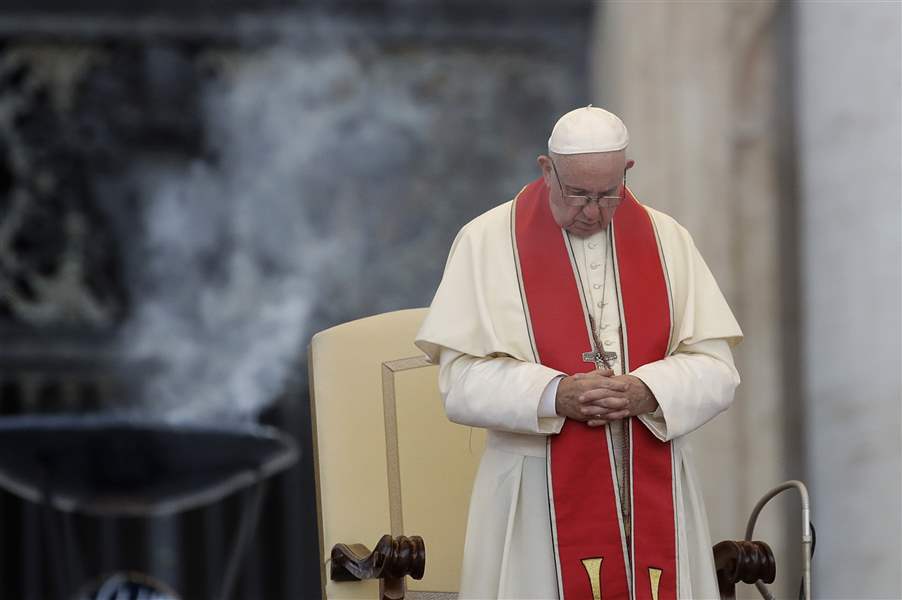
Pope revises teaching against death penalty; Toledo bishop welcomes ruling
8/2/2018
Pope Francis prays during an audience Tuesday in St. Peter's square at the Vatican.
ASSOCIATED PRESS
VATICAN CITY — Pope Francis has decreed that the death penalty is “inadmissible” under all circumstances and that the Catholic Church must work to abolish it, changing official church teaching to reflect his view that all life is sacred and there is no justification for state-sponsored executions.
The Vatican said Francis had approved a change to the Catechism of the Catholic Church — the compilation of official Catholic teaching — to say that capital punishment constitutes an “attack” on the dignity of human beings.
Previously the catechism said the church didn’t exclude recourse to capital punishment “if this is the only possible way of effectively defending human lives against the unjust aggressor.”
Previous popes have upheld that position, while urging an end to the practice.
Bishop Daniel Thomas of the Diocese of Toledo said in part: “This revision is not so much, as has been reported, a change in Church teaching, as it is a natural development in her teaching held over centuries regarding the dignity and sanctity of all human life from conception until natural death.”
He added: “I welcome this revision of Pope Francis to the Catechism, which confirms in a formal way what I, together with many of my brother bishops, have already preached, advocated, and taught against the death penalty.
The new teaching, contained in Catechism No. 2267, said the previous policy is outdated, that there are other ways to protect the common good, and that the church should commit itself to working to end capital punishment.
“Recourse to the death penalty on the part of legitimate authority, following a fair trial, was long considered an appropriate response to the gravity of certain crimes and an acceptable, albeit extreme means of safeguarding the common good,” the new text reads.
It said today “there is an increasing awareness that the dignity of the person is not lost even after the commission of very serious crimes.” New systems of detention and sanctions have been developed that don’t deprive the guilty of the possibility of redemption, it added.
“Consequently, the church teaches, in the light of the Gospel, that the death penalty is inadmissible because it is an attack on the inviolability and dignity of the person and she works with determination for its abolition worldwide,” reads the new text, which was approved in May but only published Thursday.
Francis has long made prison ministry a mainstay of his vocation and even opposes life sentences, which he has called “hidden” death sentences.
On nearly every foreign trip, Francis has visited with inmates to offer words of solidarity and hope, and he still stays in touch with a group of Argentine inmates he ministered to during his years as archbishop of Buenos Aires.
The death penalty has been abolished in most of Europe and South America, but it is still in use in the United States and in Asia, Africa, and the Middle East.
In an accompanying letter explaining the change, the head of the Vatican’s doctrine office said the development of Catholic doctrine on capital punishment didn’t contradict prior teaching but rather was an evolution of it — a defense to fend off critics who already have accused the Pope of heresy for challenging past doctrine on capital punishment.
Cardinal Luis Ladaria, prefect of the Congregation for the Doctrine of the Faith, said the change aims to “give energy” to the anti-death penalty movement and “to encourage the creation of conditions that allow for the elimination of the death penalty where it is still in effect.”
Francis is not alone.
Perhaps the most famous Roman Catholic anti-death penalty campaigner is Sister Helen Prejean, whose book Dead Man Walking — about her spiritual ministry to a man on death row — helped fuel opposition in the United States to capital punishment. And plenty of Catholic organizations are active in the anti-death penalty campaign.
It was Francis’ citation of the Gospel, however, that sparked criticism from some on the Catholic right, who cited Scripture in arguing that Francis had no authority to change what previous popes taught.
“He is in open violation of the authority recognized to him. And no Catholic has any obligation of obedience to abuse of authority,” the traditionalist blog Rorate Caeli posted on Twitter.
The Rev. James Bacik, a theologian, writer, lecturer, and retired priest in the Catholic Diocese of Toledo, also took note of the Pope’s announcement.
“This is a direction in which the church has been moving now ever since the pontificate of John Paul II, who started to question whether the death penalty really made sense in the modern world as a deterrent,” Father Bacik said.
“A great example of that, in modern times, is our teaching on religious liberty, which at one time the church did not espouse fully but now does as a result of the teaching of the Second Vatican Council,” the priest continued.
To change the doctrine is to “put an official stamp on this new teaching. That’s the Pope’s way of saying this is now the official teaching and he expects people around the world to be abide.”